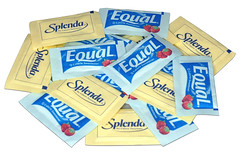 Image by Bukowsky18 via Flickr
Image by Bukowsky18 via Flickr
I thought this study was quite interesting because I've often wondered if artificial sweeteners really were the best substitute for sugar.
As I mentioned, in the lab, when we were studying low-carb dieters, whenever we'd allow someone to have an artificially sweetened food, it would knock them out of ketosis . If you don't know what ketosis is, it's the state your body will enter in order to use fat as a major fuel source when you're not consuming a lot of carbohydrates.
So, in the case of artificial sweeteners, even though they're considered a "zero-calorie" food item, the body seems to actually be responding to it just like it was sugar.
In fact, that's what the investigators stated:
Artificial sweeteners activate sweet taste receptors in enteroendocrine cells, leading to the release of incretin, which is known to contribute to glucose absorption. Recent epidemiologic studies in Circulation (2008;117:754-761) and Obesity (2008;16:1894-1900) showed an association between diet soda consumption and the development of obesity and metabolic syndrome.
Also, looking into pubmed, you will find plenty of other studies that say the same thing.
For example, this study by Nakagawa Y et al, PLoS One. 2009;4(4), Sweet taste receptor expressed in pancreatic beta-cells activates the calcium and cyclic AMP signaling systems and stimulates insulin secretion, states:
...artificial sweeteners such as sucralose, succharin, and acesulfame-K increased insulin secretion and augmented secretion induced by glucose. ...
Then, this study by Swithers SE et al, A role for sweet taste: calorie predictive relations in energy regulation by rats, states:
We found that reducing the correlation between sweet taste and the caloric content of foods using artificial sweeteners in rats resulted in increased caloric intake, increased body weight, and increased adiposity, as well as diminished caloric compensation and blunted thermic responses to sweet-tasting diets. These results suggest that consumption of products containing artificial sweeteners may lead to increased body weight and obesity by interfering with fundamental homeostatic, physiological processes.
So, what's the answer? What should we use instead of sugar?
Well, in my personal opinion, we've become a nation addicted to sugar and most of us need to go to rehab. I know that sounds a little harsh, but I think it's true.
We've lost our appreciation for Mother Nature's sweetness from fruit and other natural foods and instead need to go to sickenly high levels of sweetness with excess sugar/artificial sweeteners to get any satisfaction.
Sure, a little sugar can be ok, but why do we need to drink/eat everything with a mega-dose of sweeteness?
How many times have I heard that "I just can't go without my Crystal Light, or Chocolate Cake, or Ice Cream or Sweet Treat, etc, each day?" Way too often.
Sugar is almost like cigarettes or another addictive substance. It may not seem easy to quit it at first, but it is possible.
I have one female client for example that only used to use artificially sweetened whey protein products. She then switched to unsweetened hemp protein, rice protein and egg white protein for a month. When she went back to the original whey product, she was disgusted at how sweet it was!
On the topic of whey protein: I now buy unsweetened whey protein from trueprotein.com. I don't miss the sweeteness at all and the natural vanilla extract added to it makes it very enjoyable in smoothies, in oatmeal, etc. You should try it too.
So, the take home message is that artificial sweeteners seem to be no better, and in fact might be worse that regular sugar (now, I'm not talking about HFCS here, just regular sugar).
Try to reduce your taste preference for sugar by reducing all artificial sweeteners in your diet. If you need the sugar, just eat something with natural sugars, or with real sugar instead and be accountable to those calories instead of thinking your doing your body a favor.
Once you start to eat less sugar, you'll start to crave it less and find many foods sweeter than they need be.
Please let me know your thoughts.
In health, Cassandra
![Reblog this post [with Zemanta]](http://img.zemanta.com/reblog_e.png?x-id=cf4583e2-e0cf-435d-ab72-a19381abb9cb)
ROTATING_4+copy.gif)




12 comments:
Hey Cassandra. Love your blog. I figured you could decline this so it didn't appear on the site, but you had a small typo you may want to correct.
It left off the U from buy.
"On the topic of whey protein: I now by unsweetened whey protein"
My fiancee has just started using Glucomannan. I'll let you know how she does with it.
Thanks Low Carb! No worries from me about the typo. Thanks for noticing it!
I was asking myself this same question a couple of days ago and was about to do some research - this couldn't have come at a better time for me. Thanks - and being as I try to eat more natural and less processed foods, I am very happy with the conclusion.
I know people who drink regular soda by the gallon while lecturing me on the evils of aspartame. HFCS is also an artificial sweetener.
Enjoy the blog - lots of good info.
Great post! This was just what I needed to read to finally get me to cut back even more.
When you say artificial sweeneter, does this include all calorie-free or low calorie sweeteners, even stevia?
Hi Cassandra,
I've been reading your blog for a few months and am really enjoying it. It makes me consider nutrition in a different light.
Question: I recently started to use stevia. Is that included in the research or not. I have heard it is "natural."
I understand that stevia, regardless of its natural claims, still does the same thing as other sweeteners and I am going to try my best to decrease all sweeteners in my daily life either way, but I was just curious what your thoughts are on this product?
thanks!
Leslie
Cass, this is an awesome post. I have been chewing gum non stop for about 3 years now. I just stopped one day, about 2 months ago and I feel (and this is not an exaggeration) completely renewed. I have had asbolutely zero desire to chew gum since! I am so much more cued into my inner feedback and I can really appreciate genuine hunger signals so much better. Artificial sweeteners - in my experience and opinion - really affect our ability to follow our intuition when it comes to eating and health.
Love these posts... so thought-provoking!
I have been seeing the info on the insulin response for everything sweet. Though it seems like the effect is minimized if you only consume it with no food. (diet soda in the afternoon or evening without food)
Also what if you use it post workout with high protein and zero carbs? Does it also prevent you from consuming muscle protein and switch over to protein synthesis without extra carbs being stored after exercise?
Also anybody have any unsweetened proteins they can recommend for Germany (or continental Europe)
Hey Cassandra! This is Lorien -found your blog and thought I'd follow it as a way to stay in touch. :-)
I'm following a ketogenic diet as you know (down almost 25 pounds!!) and I've noticed that aspartame will kick me out of ketosis, but I have not had a problem with sucralose. I have noticed that like salt, sweetness seems to be an aquired taste.
Genie: I'm not sure about stevia. It seems to be safer than artificial sweeteners, but to me the bottom line is that your body still reacts to it like sugar, so just use it in moderation.
Leslie: as I commented to Genie, it seems from the research that they're aren't the adverse effects with Stevia as there is with artificial sweeteners. I think it's a much better choice.
Jaya: Luv ya girl!
Lorien: thanks for the feedback! Very interesting.
Questionfit: that's a very curious question. I'm not sure. But, from the literature, it would seem that way. But, you have to remember that whey protein itself also elicits an insulin response, so perhaps you don't even need the carbs or artificial sweeteners (for super high endurance athletes burning tons and tons of glycogen, that might be a different story though.)
I am going to start using Glucomannan because of your blog! I wish I could live with you so I could eat exactly what you eat. I feel like I don't know anything about what is in the food I eat, and it seems so overwhelming to try and decipher labels and choose the best brands without all the artificial junk in them.
Great blog -- I'm a medical illustrator in training with a strong interest in fitness and nutrition. It's nice to see a nutrition site with some solid, scientific information on it. It seems like a lot either don't say a lot or give outdated information.
Post a Comment